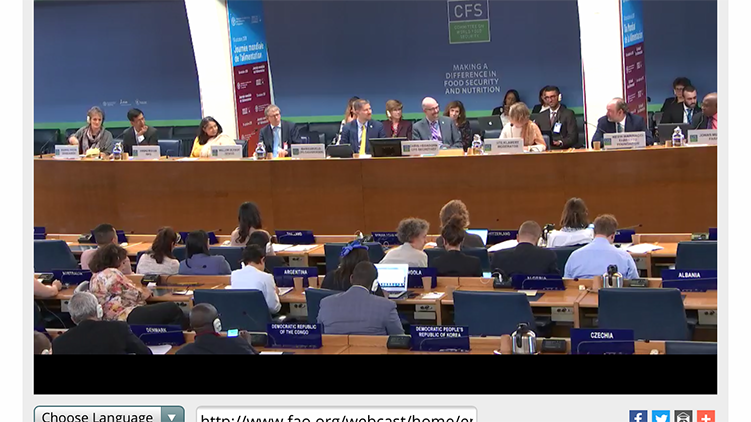15 October 2019, Rome, Italy – CFS 46 – VI MULTISTAKEHOLDER PARTNERSHIPS TO FINANCE AND IMPROVE FOOD SECURITY AND NUTRITION IN THE FRAMEWORK OF THE 2030 AGENDA. Patti Rundall, policy director of International Baby Food Action Network, (IBFAN). Committee on World Food Security, 46th Session, 14-18 October 2019, FAO headquarters (Plenary Hall). Statement from the Civil Society Mechanism (CSM)
Webstream: http://www.fao.org/webcast/home/en/item/5117/icode/ (Intervention starts 2.21 – 2.28)
Click Here for the CFS website with the text of all the Multistakeholder interventions. Click here for the PDF of the short paper on SUN
Thank you Madam Chair and thanks for the very interesting interventions. I want to say, before I start, that my presentation is not intended as a criticism of the many people who choose to work closely with companies in Multi Stakeholder Partnerships – I am absolutely convinced that everyone who has spoken does so for the right reasons.
However, my presentation is based on IBFAN’s 40 years of advocacy for strong laws, UN resolutions, codex standards and guidelines that aim to improve transparency, address conflicts of interest and end harmful and misleading marketing while facilitating the right to adequate food. IBFAN’s concerns are shared by the CSM and many other public interest NGOs, movements and networks.
So, I will come straight to the point on one thing that everyone must agree, whether they take money or not: multinational corporations have played, and continue to play, a major role in the harm caused to human and planetary health. What I suspect we disagree on is whether working in partnership with them and accepting financing from corporations – especially food companies, since we are here at CFS – is a wise thing to do.
In our experience, governments attempting to retain, improve and adopt effective policies, face fierce opposition from the food industry to weaken their provisions. This is a fact and we will be going to Codex next month and we will see this happening again. Even though, when properly monitored and implemented, these laws save thousands, possibly millions of lives.
The CSM values its role in the CFS, an important inclusive inter-governmental consultative body, where governments remain the decision makers. However, at every turn we see the promotion of Multi-Stakeholder Partnerships as the answer to malnutrition, despite the fact that even the HLPE report states that there is little evidence of their efficacy. We believe this is a huge risk that will take us all in entirely the wrong direction. Indeed, we see the risk of governments and the UN being reduced to the role of facilitator, rather than the primary actors in addressing malnutrition.
I’m going to take two examples that we’ve looked at: the Scaling up Nutrition (SUN) and the European Commission Platform for Diet Physical Activity and Health.
But first let me point out that any MSP focused on nutrition that involves the food industry will invariably place great emphasis on innovation, micronutrients and fortification. Rarely is it acknowledged that this can undermine confidence in real, minimally processed, biodiverse and culturally appropriate food. All too often the sngle nutrients are promoted with claims while the multiple nutrients in breastmilk or fresh foods come with no such commercial promotion.
We have done a 3-country study on SUN and this revealed many other problems. For example, we found:
- A lack of adequate accountability procedures and a lack of truly independent monitoring. Indeed, if things go wrong no one can be held accountable.
- SUN’s Conflict of Interest policy is inadequate and confusing. It focuses on trust and collaboration rather than the need for caution.
- There is no requirement for democratic scrutiny of the implications for governance before countries join SUN. So, no Parliamentary vote or anything.
Regarding the EU Platform, along with 6 other leading NGOs, IBFAN has left because the Platform completely failed to achieve its aims. Instead of focusing on curbing marketing, the corporate members would challenge much needed proposals – focusing instead on funding nutrition education in their efforts to appear a benign force.
So we ask the following questions to all those in this room hoping to join or create an MS Partnership at country level:
- Do you have adequate safeguards in place to stop undue corporate access and influence on public food and nutrition policies?
- Do you think the MSP will speed up or slow down the progressive realization of the right to adequate food?
- Will the MSP make it easier or more difficult for the promotion of strategies that address the root causes of malnutrition: unequal power, poverty, land grabbing, harmful marketing – these sort of things?
Finally I would like to add two points:
- Just to be wary of terminology. The word ‘Partnership’ by definition, implies arrangements for ‘shared governance’ to achieve ‘shared goals’ – where shared decision-making is a unifying feature. Can I suggest we use instead ‘corporations funding government programmes’ – that’s straightforward and to the point.
- Lastly, we hope the UN Secretary-General will end the recently signed Strategic Partnership Agreement with the World Economic Forum. Nearly 300 civil society organizations and networks, believe this will risk delegitimizing and weakening the role of UN system in global decision-making.
Thank you
A few days after this session FAO Director-General Qu Dongyu and Chairman and CEO of Danone Emmanuel Faber sign an agreement: Partnership to scale up sustainable food and agricultural practices and provide people with access to more diverse and healthier foods
http://www.fao.org/news/story/en/item/1237744/icode/?platform=hootsuite

